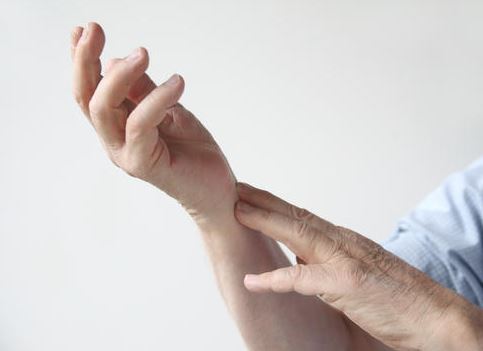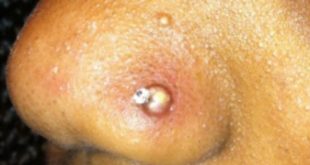Tingling in left hand, leg, or both may be momentary or chronic, mild or severe, depending on the underlying factor. The typical “pins and needles” feeling could as well be accompanied by pain, numbness and muscle weakness. Causes could be simple dehydration, vitamin deficiency, lack of exercise, drinking or stress. It could also mean serious health conditions such as heart attack, hypertension, nerve damage and diabetes. Here are causes, symptoms and treatment of left hand tingling and numbness.
Meaning – What does left arm tingling mean?
Contents
- Meaning – What does left arm tingling mean?
-
Causes of Tingling in Left Hand, Arm, and Leg
- Pinched nerve or pressure on nerves and numb left hand when waking up, in the morning
- Diabetes
- Pernicious Anemia
- Alcoholic Neuropathy
- Poor Blood Circulation
- Thoracic Outlet Syndrome
- Tingling in left hand during pregnancy
- Heart Attack, high blood pressure or low blood pressure
- Transient Ischemic Attack
- Carpal Tunnel Syndrome causes tingling in left hand thumb, pinky, small, index, ring and middle finger
- Treatment of Tingling In Left Hand and Arm
- Tingling In Left Hand and Leg or Foot and Is Sensitive to Heat
My left hand is tingling, what could be the cause? Why is my left arm, jaw, face or side tingling? What is the meaning of this numbness? Tingling is an abnormal “pin and needle” sensation that often occurs in the hands (particularly the left hand) even though it can as well occur in other parts of the body including legs, arms, and feet.
Causes of Tingling in Left Hand, Arm, and Leg
What causes tingling and numbness in one hand, leg or side. Scientifically referred to as paresthesia, tingling in left hand is in most cases caused by altered or interfered nerve activity in the left hand or arm. This commonly occurs when the peripheral nerves (found outside the central nervous system) which are responsible for provision of sensation to the hands are damaged improper blood flow may also lead to the condition. Among the potential causes of tingling in the left side of face, back and hand are:
Pinched nerve or pressure on nerves and numb left hand when waking up, in the morning

As described my Mayo Clinic, a pinched nerve is a result of too much pressure on the nerve by the tissues surrounding it. A bone, cartilage, tendons and muscles can apply pressure on a nerve and cause a pinched nerve. Temporary, slight to moderate and intermittent tingling in the left hand may be the result of putting too much pressure on the nerves.
This can, for example, happen when you spend too much time sleeping with crooked hand under your head. This will be felt in the morning, mostly when waking up. As for fingertips, tingling may result from holding on the same position for a long time.
In such cases you may end up with a “pin and needles” effect that is typically painless and goes away as soon as the pressure is relieve off your hand. The tingling sensation is usually limited to the affected hand only.
The same can happen to your leg and feet, for example when you cross your legs for too long.
Diabetes
Another likely cause of sudden tingling in left hand is diabetes. Scientifically referred to as diabetes mellitus, this is a chronic condition characterized by too much sugar (glucose) in the blood. Diabetes often causes damage to peripheral nerves, a condition known as peripheral neuropathy.
According to the WebMD, diabetes is responsible for 30% of all cases of peripheral neuropathy.
The tingly sensation, coupled by other symptoms such as numbness, mostly develops in the feet first and then move up the legs and further upwards to both hand and arms. These are, according to WebMD, the first signs of diabetes.
Pernicious Anemia
Anemia is a blood disorder characterized by lower than average amount of red blood cells. With the “shortage” of red blood cells in the blood, so to speak, the supply of oxygen to the body tissues is hampered.
When vitamin B12 deficiency is the underlying cause for anemia, the condition is referred to as pernicious anemia.
It may result when the body is unable to absorb the vitamin (B12) or due to other factors such as infections, inadequate dietary intake and surgery as the National Heart, Lung and Blood Institute says.
In addition to the common symptoms associated with anemia such as shortness of breath, fatigue, cold hands and feet, chest pain, and pale skin, pernicious anemia may also be characterized by tingling in left hand and feet in addition to loss of coordination and reflex, and muscle weakness usually as a result of peripheral nerve damage.
Alcoholic Neuropathy
As the name suggests, alcoholic neuropathy refers to damage of the nerves that results from excessive consumption of alcohol.
Although the exact cause of this kind of nerve damage is not well understood, it is believed to be the result of direct damage by alcohol coupled by the malnutrition that is commonly associated with alcoholism.
Nerve damage may result to numbness and tingling in the limbs (hands and legs) alongside other symptoms such as muscle cramps and weakness, constipation, diarrhea, nausea, vomiting, and urinary problems. The symptoms usually develop slowly and worsen over time.
Poor Blood Circulation
Poor blood circulation usually manifests itself in the form of tingling sensation coupled with other symptoms such as cold and clammy hands, inability to make quick movements of the left arm or left side of body, and the appearance of venous stasis ulcers in the forearm which is usually attributed to inadequate supply of oxygen.
Poor circulation of blood may occur due to conditions such as atherosclerosis, Vasculitis (inflammation of blood vessels), and frostbite. Tight-fitting jewelry and clothing have also been shown to be potential impediments of proper blood circulation and may be the underlying factor for numbness and tingling in left hand or any other part of the body.
Thoracic Outlet Syndrome
Another common cause of tingling in left hand (when it affects the left hand) is thoracic outlet syndrome. According to The National Institute of Neurological Disorders and Stroke (NINDS), the condition occurs as a result of compression of nerves or blood vessels anywhere between the base of the neck and the axilla or armpit and arm.
Factors for thoracic outlet syndrome range from congenital (birth) defects such as cervical ribs, to trauma, poor posture, cervical tumor, pregnancy, overuse and repetitive strain injury, and obesity.
The condition is marked by numbness and tingling in the affected hand or arm, weakness of grip, pain in the neck and shoulder area, hand discoloration, swelling of the arm, and dark spots in areas of static blood circulation. The prognosis for thoracic outlet syndrome varies among individuals as the NINDS points out.
Tingling in left hand during pregnancy
According to The Bump, tingling hands, up the arm and feet is one of the signs of pregnancy. Sarah Prager, MD says that as a sign of early pregnancy, left hand or right hand tingling may be experienced especially at night when lying down or when they wake up in the morning.
The cause of this symptom in early pregnancy is the swelling that usually of your hands. However, you should see a doctor because it could also mean a sign of sciatica, anemia, or carpal tunnel syndrome.
Heart Attack, high blood pressure or low blood pressure
According to newhealthguide.org, ischemic heart disease ranks as the top cause of heart attack. WebMD’s Symptom checker also lists high blood pressure as one of the health conditions associated with left hand numbness and tingling in upper arm.
Vascular defects (such as atherosclerotic plaque or atheroma development) and muscular problems of the heart (hypertensive heart) are the major underlying factors for ischemic heart disease.
Heart attack typically manifests itself in sudden numbness and tingling in the left arm and side of the chest after which a sharp pain is felt in the left jaw and shoulder which also feels weak. You should seek urgent medical attention of these signs appear.
Transient Ischemic Attack
Transient ischemic attack is characterized by symptoms similar to those of stroke but unlike stroke, it doesn’t cause any long-term or permanent damage.
The condition occurs when the flow of blood to the brain is blocked temporarily by a blood clot resulting in symptoms such as numbness and tingling in the hands, arms, face, and legs; dizziness, blurred vision, slurred speech, and difficulty understanding other people’s speech.
The causative blood clot commonly develops as a result of chronic accumulation of plaque on blood vessel walls.
According to Mayo Clinic, transient ischemic attack is usually a warning sign for an impending stroke and thus warrants immediate medical attention.
Carpal Tunnel Syndrome causes tingling in left hand thumb, pinky, small, index, ring and middle finger
The carpal tunnel is the narrow passageway on the palm side of the wrist through which the media nerve and tendons (nine in total) run. Any factor that causes compression of the median nerve e.g. repetitive use from typing on a keyboard may cause a condition known as carpal tunnel syndrome.
Carpal tunnel syndrome is characterized by tingling in the affected hand, wrist and arm which may be accompanied by wrist pain that extends up to the shoulder and fingers (pinky, ring finger, index finger, thumb, middle finger ) as well as weakened grip. When fingers are involved, carpal tunnel syndrome typically affects the thumb, index, middle, the ring finger (usually half of it), making them feel numb as well as tingly.
Other likely causes of tingling in the left hand are:
- Anxiety
- Systemic diseases such as liver disease, kidney disorders, connective tissue disorders and chronic inflammation, and amyloidosis.
- Side-effect of certain medications such as chemotherapy and antiretroviral medications.
- Toxins the likes of heavy metals (e.g. mercury and lead) and certain industrial chemicals.
- Nerve Injury e.g. from trauma leading to nerve compression or damage
Treatment of Tingling In Left Hand and Arm
We have looked at some of the potential answers to the question “Why is my left hand and arm tingling?” which brings us to the next question, “how is the tingling sensation treated?”
Effective treatment of tingly sensation in the hand hinges upon accurate diagnosis of the underlying causative factor. With appropriate treatment, assuming they have not been killed, the peripheral nerve cells may be rejuvenated. The only exception is congenital types of peripheral neuropathy for which there is nothing much that can be done.
Here is a breakdown of treatment for the various acquired types of peripheral neuropathy and hence the tingling:
Nerve pressure: In most cases, treating the slight tingling that occurs as a result of prolonged pressure on nerves is as easy as moving the affected hand and arm to relieve the pressure and then stretching it out to facilitate proper blood circulation.
Diabetes: Diabetic neuropathy can be slowed down by controlling your sugar levels. Your doctor will recommend ways of doing it and prescribe appropriate medications.
Pernicious Anemia: Vitamin supplementation is usually effective a treatment for people with vitamin deficiencies including those with pernicious anemia.
Alcoholic Neuropathy: When alcoholic neuropathy is to blame for tingling in left hand and arm (or any other part of the body for that matter), treatment regime begins with cessation of alcohol followed by other options such as vitamin supplementation, physical therapy, and medication.
Poor blood circulation: Physical activity that boost blood circulation via heart are often the starting point for tingly sensation attributed to improper blood circulation. Exercises that specifically target the hands and arms such as climbing, hiking, swimming, weight lifting also constitute a good treatment measure.
Thoracic outlet syndrome: Weight management and maintaining proper posture go a long way in the management of thoracic outlet syndrome. Athletes such as swimmers may also require lifestyle modifications to avoid overuse and repetitive strain injury. Acupuncture and massage therapies can also help to relax the affected nerves and reduce the tingly sensation.
Transient ischemic attack: Treatment of transient ischemic attack revolves around preventing the development of stroke and may involve the administration of anticoagulants and other medications, and in some cases surgery.
Carpal tunnel syndrome: Treatment and management of carpal tunnel syndrome hinges upon relieving of the pressure on carpal tunnel syndrome. Rotating the affected wrists coupled with stretching of the arms may offer relief. The mayo clinic also recommends taking frequent breaks when typing on a computer and sitting in the right posture.
When to Seek Urgent Medical Attention – tingling in head, headaches and lightheadedness
Tingling in left hand, head and arm (or any other part of the body) may be a symptom of a serious condition such as a heart attack. You should thus seek medical attention for tingly sensation lasts more than a few minutes or keeps recurring.
You should however seek the attention of your doctor urgently if:
- The tingling is accompanied by confusion or altered level of consciousness.
- You develop slurred speech or seem to be losing sensory control of your limbs (hands, arm) or parts of the body.
- The tingly sensation follows an episode of severe headache and lightheadedness (may be a first sign of heart attack)
- You have had an incident of assault, injury, or fall in the recent past
Tingling In Left Hand and Leg or Foot and Is Sensitive to Heat
If you have tingle sensation in the left hand and leg or foot which is accompanied by sensitivity to heat (heat intolerance), one of the following conditions could be the underlying cause:
Thyroid Disorder (Hashimoto’s Thyroiditis)
This is an autoimmune condition that is associated with destruction of thyroid gland cells. At the onset, thyroid cell destruction causes excessive release of thyroid hormone, leading to transient acute hyperthyroidism but as the destruction further progresses, thyroid hormone falls dramatically due to presence of too little thyroid cells, resulting in hypothyroidism.
Hashimoto’s thyroiditis is associated with numerous autoimmune conditions including pernicious anemia, diabetes, celiac disease, Graves’s disease, and adrenal insufficiency.
The acute hyperthyroidism stage of Hashimoto’s thyroiditis is associated with heat intolerance (being extremely sensitive to heat) alongside other symptoms such as rapid heartbeat, fatigue, weakness, increased appetite, weight loss, loss of bone density, nervousness, shortness of breath, night sweats, and bulging eyes.
Pain in arm, chest, neck pain, back pain and pain under left breast and shoulder
The chronic hypothyroidism stage on the other hand manifests itself in symptoms such as tingling in hands and feet, fatigue, weakness, constipation, muscle and joint pain, sparse hair, decreased memory, sparse hair, swollen eyes, hands, and feet, weight gain, hoarseness, hearing impairment and cold intolerance.
If you suspect Hashimoto’s thyroiditis, it is advisable to see your doctor for appropriate diagnosis and treatment. Treatment usually involves treating any other associated autoimmune condition such as adrenal insufficiency, hormone replacement therapy, and observing proper diet (gluten-free).
Alcoholic Neuropathy and tingling during and after exercise, running
Alcoholic neuropathy (discussed previously in this article) may as well cause heat intolerance according to the Healthline website. This tends to occur more commonly after exercising or engaging in strenuous physical activity such as running etc. It might be accompanied byshortness of breath and feeling dizzy.
Treatment begins with addressing the actual drinking by for example taking the patient to a rehab center after which the alcoholic neuropathy is treated medically using a mix of vitamin supplements, prescription medications, physical therapy, and sometimes special stocking to stop dizziness.
Multiple sclerosis and left hand keeps tingling, comes and goes for days, hours and won’t go away
Do you keep getting a numb hand with tingling that won’t go away for days, hours or weeks? Does it sometimes come and go? Multiple sclerosis is another common cause of hand and foot numbness and tingling and sensitivity to heat. This is a chronic, autoimmune disease that affects 2.3 million people worldwide, over 400,000 of whom are in the US according to The National Multiple Sclerosis Society.
Unlike the typical tingling and numbness that occur from placing excessive pressure on nerves, usually clearing within a few minutes of pressure relief and blood circulation restoration, multiple sclerosis-linked tingling develops over a period of several days and can last for as long as a few weeks.
References and Sources


